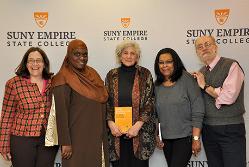"Around the College" is no longer being updated.
View current SUNY Empire Stories.
February 16, 2016
Experiential Learning Celebrated

A celebration of experiential learning recently took place at SUNY Empire State College’s Manhattan location
More than 30 students, faculty, staff and alumni joined in a broad discussion of the nature of experiential learning, its impact on individual students and on higher education nationally.
“Through several evaluations and re-evaluations of myself as an adult learner, I have been striving to make sense of my experiences,” said Tanya Rice Thompson ’14, who earned a B.S. in Community and Human Services and now is a candidate for a Master of Arts in Adult Learning. “My desire to be academically successful has allowed me to construct a new narrative for my life.”
“As a student of SUNY Empire State College, I was able to draw from my experiential learning to transform myself academically, professionally and personally,” said Layla Abdullah-Poulos ‘10, a graduate student pursuing a Master of Arts in Liberal Studies. “My experience with prior learning at SUNY Empire State College was empowering. SUNY Empire’s faculty let me know that my experience was valued and that what I had learned would carry forward, which gave me confidence. SUNY Empire’s faculty should be applauded for creating a safe place for students to bring their experience forward.”
As undergraduates, both earned college credit for their college-level learning acquired in nontraditional ways. Abdullah-Poulos earned 61 credits, nearly half of her undergraduate degree requirements; Thompson earned 16 credits, which, according to both students, bolstered their self-confidence and empowered them as learners.
In addition to Abdullah-Poulos and Thompson, the celebratory event featured Alan Mandell, professor of adult learning and mentoring, and Elana Michelson, professor of adult learning and cultural studies with the college’s School for Graduate Studies.
Associate Dean Cathy Leaker acted as master of ceremonies.
The celebration included a signing by Michelson of her new book, “Gender, Experience and Knowledge in Adult Learning: Alisoun’s Daughters" (Routledge, 2015).
Michelson noted that the claim of learning from experience is both fascinating and complicated.
“Whose experience are we talking about? How do we understand what `experience’ is? I want to celebrate experiential learning,” said Michelson. “But I want to do so in a way, as my co-panelists have done, that requires us to be thoughtful and careful about what we are saying.”
When it comes to the assessment of experiential learning in higher education across the country, now a rapidly growing trend, Michelson emphasized the need to communicate and have hard conversations across different sites of experience and knowledge, conversations which have been ongoing at the college since its founding in 1971.
Through the college’s rigorous, academic process of individualized prior learning assessment (PLA) and other nationally accepted modes of assessing past learning, such as standardized tests and some professional licenses, students are able to earn credit for their college-level learning acquired by nontraditional means, which enables them to avoid spending time in classes and on subjects they already have mastered and save on the cost of their degree.
Mandell discussed the national context for PLA and said, “The fight for PLA is part of a movement for freedom, for access, for recognizing the learning of those who have been excluded.”
“At the heart of the debates about ‘experiential learning’ is the radical recognition that there are multiple knowledges that emerge from multiple sources,” said Mandell. “The university has no monopoly on knowledge at all.”
The event took place Wednesday, Jan. 27, at the college’s Manhattan location and was sponsored and organized by student/alumni clubs Minority Students in Action and ESC Education for All.
